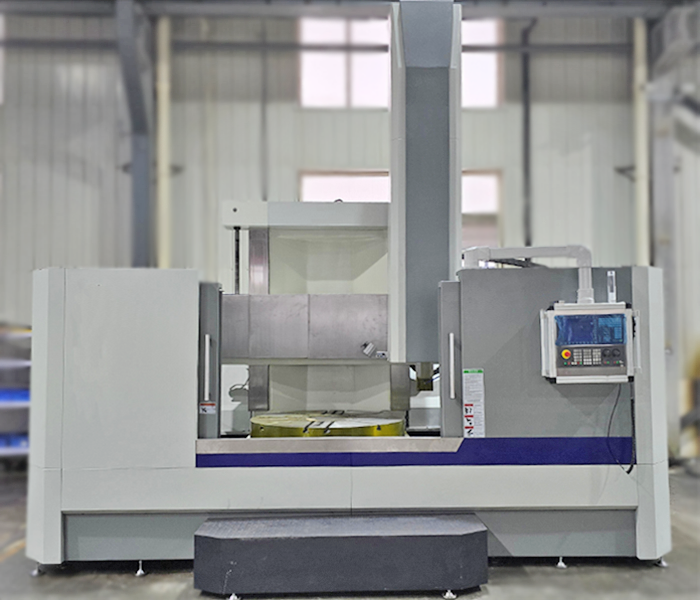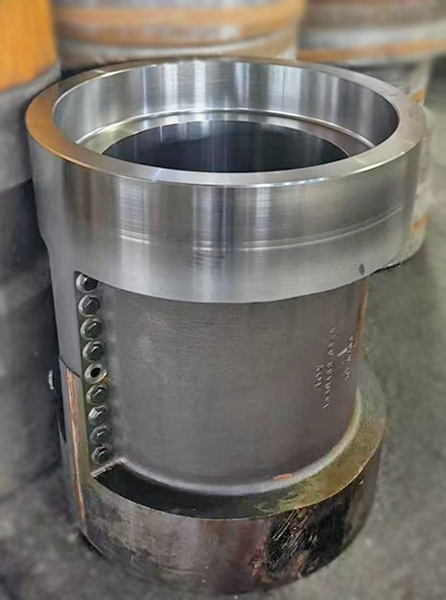
CNC vertical lathe is a kind of high-efficiency and high-precision metal cutting equipment, mainly used for the processing of rotating parts (such as discs, rings, and short shaft parts).
Recently, a South African customer was looking for a CNC vertical lathe to process their cylindrical workpieces, requiring a maximum turning diameter of 1600mm and a maximum turning height of 1200mm, and provided a picture of their product, as shown below:

After confirming the specific output and configuration requirements, Shanghai Antis successfully recommended CH5116 single-column CNC vertical lathe with a maximum turning diameter of 1600mm, a maximum turning height of 1250mm, and a maximum workbench bearing 8 tons. Fanuc CNC system, the specific configuration is as follows:
| Specifications | Unit | CH5116 |
| Workbench diameter | mm | 1250 |
| Max.turning diameter | mm | 1600 |
| Max workpiece height | mm | 1250 |
| Max.workpiece weight | T | 8 |
| Max.torque of workbench | KN·m | 14 |
| Tool magazine capacity | Pcs | 12 |
| Beam lifting motor power | kw | 7.5 |
| Beam classification positioning pitch/series | mm | 125/8 (9 positioning) |
| Main motor power (AC) | kw | 37 |
| Machine weight (approximately) | t | 20 |
The following is the standardized processing process of Antis engineers for machining cylindrical workpieces (such as shafts and disc parts) by CNC vertical turning, combining process logic and operating points to disassemble:
1: Preparation before processing
1) Drawing analysis
Confirm the size (diameter, length, tolerance), surface roughness (such as Ra0.8µm), shape and position tolerance (coaxiality, verticality).
Confirm the material type (such as 45 steel, aluminum alloy) and heat treatment status (quenching and tempering, quenching and tempering)
2) Process planning
Machining sequence → Clamping scheme → tool selection
3) Equipment inspection
Guide rail lubrication, spindle clearance, turret positioning accuracy (manual test turret).
Coolant system (flow rate, concentration, anti-rust liquid is suitable for steel parts, kerosene is suitable for aluminum alloy):
2: Workpiece clamping and tool alignment
Clamping the workpiece: A three-jaw chuck clamps the outer circle of the workpiece (clamping length ≥1/3 diameter), and after manual preload, the low-speed idling is calibrated to run out (≤0.05mm).
Long shaft parts: one end is clamped by a chuck, and the other end is supported by the top of the tailstock (adjust the top pressure to avoid bending of the workpiece).
Knife operation (take FANUC system as an example)
3: Programming and parameter setting
4: Processing implementation:
1) The first trial cut: the air transport program (DRY RUN) checks the path, and the single-stage execution (SBK) confirms each step of the action.After the first piece is processed, measure the key dimensions (micrometer to measure the outer diameter, dial indicator to measure the coaxiality), and adjust the tool compensation (such as X-axis compensation -0.05mm)
2) Automatic processing
Turn on the coolant (to avoid thermal deformation) and close the protective door.
Monitoring status: spindle load (no more than 80% of the rated power), chip shape (C-shaped chips for steel parts, ribbon chips for aluminum parts).
Midway tool change: Use automatic tool change (such as turret indexing) to check the wear of the tool (replace it in time when the tip of the tool collapses).
5: Post-processing treatment
1) Workpiece inspection
2) Equipment maintenance
Clean up the chips (compressed air purging, no contact with hands), and the guide rail is oiled and rust-proof.
Record the tool life (such as replacement after 50 pieces of cemented carbide knives are processed), and update the processing log.
Keywords: CNC vertical lathe, CNC vertical lathe machining, lathe machining


